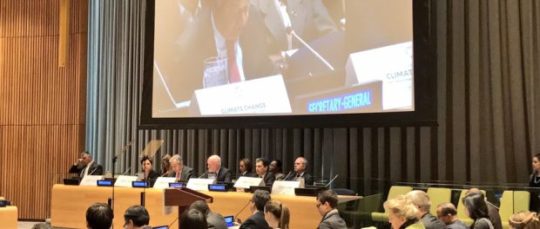Guterres, climate change is real; Italy lends support to Africa, SIDS in reaching SDGs
Twitter: @melonimatteo
NEW YORK, MARCH 24 – Climate change and the Sustainable Development Goals were the main themes on the agenda of the High Level event convened by the UN General Assembly. The adoption of the 17 SDGs in 2015, and the Paris agreement signed in 2016 are two important milestones in the framework of international relations, and UN member states are now discussing a further implementation of the actions to follow.

In his remarks, the Secretary-General Antonio Guterres affirmed that “We are dealing with scientific facts, not politics. And the facts are clear. Climate change is a direct threat in itself, and a multiplier of many other threats. We face serious risks across the whole of the 2030 Agenda. Food security is under threat around the world due to more droughts. With food insecurity, we must add economic insecurity as scarcities of staple crops cause price surges”.
Guterres underlined that the countries that supported the Paris Agreement are the same that adopted the Sustainable Development Goals, and the reason for this consensus, for the Secretary-General, is clear: “All nations recognize that implementing the 2030 Agenda goes hand-in-glove with limiting global temperature rise and increasing climate resilience. Every month, ever more countries are transforming their pledges into national climate action plans”.
Giovanni Brunelli of Italian Ministry of Environment, Land and Sea outlined Rome’s commitment on the issues, and explained that Italy, as a priority, is engaging through bilateral and multilateral cooperation with several partners such as African countries and Small Island countries to promote mitigation and adaptation oriented on the ground projects. “The transition towards a new agenda for global action, environmentally and socially sustainable, therefore must be seen as the best answer to make our economies and lifestyles more equitable and sustainable and more effective in reducing poverty”, said Brunelli.
Italy adopted last year a decree that foresees the elaboration of an annex to the Economic and financial document which includes the trend of indicators on equitable and sustainable wellbeing on the basis of the economic measures envisaged, and submitted last October its candidature to present Voluntary national reviews of the implementation of the 2030 Agenda and has started to develop a national strategy for sustainable development to achieve greater coherence and synergies in all sectors involved.
Climate change is on the agenda of the next G7 summit of Taormina (26-27 of May 2017): various aspect of the Paris agreement’s implementation will be discussed, such as necessary reforms, support, and G7 countries’ full engagement for long-term low greenhouse gas strategies. Climate change and SDGs will be high agenda of the Bologna G7 environment ministers’ meeting as well in June.
“Trying to understand what environmental pollution and climate change effects may mean for the future of our economies is daunting. It is not simply the case of coming up with a point estimate of what it might cost to world economy – affirmed Brunelli – but a nuanced understanding of how it impacts sectoral and regional economic activity, how it propagates through our economic system, and what the downside risks are to migrations, health and social wellbeing. If we do not start taking additional action now – continued the Italian officer – we will witness a growing number of people hit by hunger, poverty, illness and conflicts, as proved by the refugee crisis in Europe, that has sharpened the world’s focus on these concepts”.
Peter Thomson, President of the 71st Session of the General Assembly, said that he believes that the new strategic partnership that are being forged to drive the SDGs implementation must be leveraged to promote climate action. “The scaled-up resource mobilization efforts which are drawing public, private, blended and alternative sources towards SDG implementation can also simultaneously pursue regulatory reforms that help economies transition to inclusive, low-carbon models. And the innovative and disruptive technology that is already driving the transition towards cleaner, renewable energy sources – continued Thomson -must also be harnessed to drive action on SDG implementation”.
For the President of the General Assembly “the United Nations has a critical role to play, and under the leadership of Secretary-General Guterres, the organization is already reviewing its structures to ensure that it is able to respond coherently, efficiently and effectively to the emerging challenges of our time, including to support SDG implementation”. (@OnuItalia)
This article first appeared in Onuitalia, independent news site on Italy’s contribution to the life and ideals of the United Nations